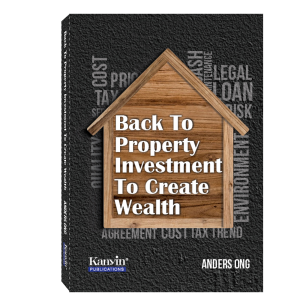Contributed by Anders Ong
Property cycles happen due to the economic principles of supply and demand and influence by political, demographic, and socio-economic factors
We might wonder why there are times when property investments are performing well and there are times when property investments make people suffer. This is all down to the simple theory of the Property Cycle, the periodic and sequential cycle of real estate where prices go up and down.
The property cycle happens from time to time, but it does take quite a long time for a complete cycle – which can range from 10 to 30 years in some countries. The duration is the reason no one seems to notice them, as these cycles can take some time to complete and an amateur investor could become a professional during such a long period of investing.
The property cycle is also the answer and reason for the myth of why property prices always go up in the long run. There may be some slumps or decreases in property prices but these are mostly only temporary and part of the property cycle trend. Eventually, when the cycle starts all over again, it will start from a higher bottom price than the previous cycle's bottom price due to land scarcity and inflation. The demand for property will always increase due to population growth and the limited supply of land for development.

Photo by Denys Nevozhai on Unsplash.
The first recorded study of property cycles was by Homer Hoyt's "100 Years of Real Estate Values in Chicago" in 1933 and popularised by the "18-Year Property Cycle" developed by the economist Fred Harrison. They are the first few people to identify the existence of property cycles. Fred Harrison concluded that the length of a full property cycle averages out to 18 years and can be divided into four distinct stages: recovery, expansion, boom, and recession.
Up-cycle Trends
-
Recovery
During this stage, there is rising confidence in the property buying market. Rental rates started to rise, the time taken to sell off a property is reduced, and the prices and values of properties increase. Banks are hungry and ease their lending criteria and approve more loans.
-
Mid-Cycle Dip

Photo by Hunters Race on Unsplash.
Once the market starts to recover there will be a small mid-cycle dip as some early investors take profits before the expansion phase of the market.
-
Expansion

Photo by Brandon Green on Unsplash.
Bank interest rates are low and loan approval is easier, buyer sentiment and media perception are positive, property prices increase more rapidly and rentals increase. Properties will be sold above their market value and sellers will continue to increase prices for more profits. Every expansion stage also brings in younger generations of investors into the market due to encouragement at seminars and by property gurus. Many people will borrow against their increased house values, even seasoned property investors will be driven as they worry about missing out.
-
Cycle Peak

Photo by Samuel Zeller on Unsplash.
This is the final few years of the expansion phase, where prices reach their peaks before dropping abruptly soon after. Fred Harrison describes the enthusiasm of this period as the “Winners’ Curse”. Most properties bought at this peak will be valued lower or worth less than the price paid. This happens due to property prices rising too quickly alongside a high growth of liability and credit due to heavy borrowing, overconfidence leading to oversupply, and more speculators looking for a quick property flip.
Down-cycle Trends
-
Recession
This stage of the property cycle is characterized by oversupply, decreasing growth, plummeting prices, more sellers, fewer buyers, greater difficulty in securing loans, homes becoming more difficult to sell, past buyers overleveraging, increased vacancies, increasing auctions, reduced cash flow, and negative perception fed by daily doses of news about oversupply and auctions. This is also the result of the rapid supply and high selling in the boom phase. Property price could stagnate, or even drop, due to purchases made during the boom period, which people could not afford – so they had to sell at lower prices.
-
Cycle Bottom

Photo by Jukan Tateisi on Unsplash.
This stage of the property cycle reflects the lowest stage of the cycle, where most property prices are low, stagnant, and at rock bottom – and no one is buying real estate due to negative sentiment, oversupply, and losses during the recession phase.
-
Stabilisation
With falling interest rates, overnight policy rates (OPR), and the easing of lending rules and policies, prices may remain flat or rise slowly during this phase. There are more and more government initiatives and interventions in the property market to encourage homeownership, to increase take-up rates, and improve the economy.
Summary of investing tips timed to the property cycles:
- Recovery phase prices usually start higher than during the last recovery.
- Property cycles have different time variances in different countries.
- It is normal for property prices to go through ups and downs.
- Buy at the bottom of the cycle and sell at the top of the cycle.
- Do not over-leverage at the peak point of the property cycle.
- Do not panic sell when prices are dropping.
- Be a seller when everyone else is buying
- Be a buyer when everyone else is selling
- Do not be misled by the media.
In a nutshell, an understanding of the property cycle can make us better investors – and looking at market signals can impart a deeper understanding of the current property market. With some foresight, there would be nothing to be worried about during a market recession and there would be nothing to be excited about during a market explosion.
About the contributor
Anders Ong is a property investor, writer, speaker, real estate coach, property market analyst and author of "Back To Property Investment To Create Wealth".
Disclaimer
This article is intended to convey general information only. It does not constitute advice for your specific needs. This article cannot disclose all of the risks and other factors necessary to evaluate a particular situation. Any interested party should study each situation carefully. You should seek and obtain independent professional advice for your specific needs and situation.
Stay ahead of the crowd and enjoy fresh insights on real estate, property development, and lifestyle trends when you subscribe to our newsletter and follow us on social media.


















































